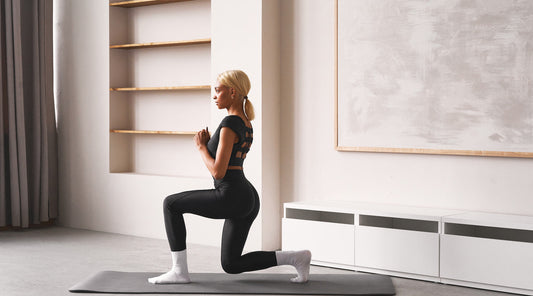Feeling stressed, anxious, unmotivated, tired, down in the dumps? Maybe an unsettling combination of all of the above? You’re not alone. Come the season of bitter cold and “holiday cheer,” many of us experience a dizzying mix of emotions, some of which can feel overwhelming.
According to a 2021 poll, 41% of Americans said their stress levels increase during the holidays (versus just 7% who said their stress tends to decrease). Anxiety around finances, travel, and family and social engagements are some main factors. During the holiday season, symptoms can also worsen for those with an existing mental illness [1].
In general, women are more likely to report increased stress during the holidays, citing lack of time and money and the extra pressure of giving (or getting) gifts. Women also are more likely to turn to food and alcohol to deal with the stress [2].
The holiday blues is similar to seasonal affective disorder (SAD), but it typically only lasts throughout the months of November and December. SAD, on other hand, is a major depressive disorder linked to seasonal patterns, and can last from around late fall to springtime [3].

Common symptoms of the “holiday blues”
The “holiday blues” can feel a lot like clinical depression. However, it’s important to remember that these feelings are temporary. You may experience [4]:
- Sadness
- Frustration
- Lack of motivation
- Reduced focus
- Irritability
- Isolation
- Fatigue
- Sleep disturbances
- Loneliness
- Dissatisfaction
- Sense of loss
- Hopelessness
With the holiday season in full gear, we encourage you to stay in tune with yourself.
Remember that you have control over these feelings. The following 8 tips can help you get through the holiday blues.
1. Get good quality sleep—but not too much.
Sleep is important all year long, of course, but it can be even harder to get the recommended 7 hours a night during particularly hectic times (i.e. the holidays). The shorter days and longer nights can also impact your circadian rhythms. With reduced sun exposure, your body produces more melatonin (the sleep hormone), making you feel tired more often. You may even end up sleeping too much, which can leave you feeling sluggish throughout the day. Try to stick to your usual sleeping schedule and continue to work on healthy sleep habits.
2. Soak in some sunshine.
Speaking of the sun, you’ll want to soak up as much of it as you can. A lack of daylight—specifically early morning light—can dampen your mood and motivation. Bright morning light helps shift your rhythm so that you feel sleepier earlier in the evening and wake up earlier in the morning [5]. Direct sunlight can have up to 100,000 lux (a measure of illuminance), and even on cloudy days, there can be around 10,000 lux of light available [6]. If it’s hard to get outdoors, you might want to try a light therapy box, which can provide around 10,000 lux of light.
3. Keep up an exercise routine.
Whether it’s a quick walk, jog, or mini yoga session, try to take some time to move your body on a daily basis. The benefits of physical activity are seemingly limitless and it’s a guaranteed mood-booster (and body-warmer!). Exercise has been proven to reduce anxiety and depression. One theory centers on the increase in blood circulation to the brain and the influence on the hypothalamic-pituitary-adrenal (HPA) axis and how it responds to fear, stress, mood, and motivation [7]. This doesn’t mean you always need to get in a sweaty workout, though. You can simply crank up the holiday tunes and dance! Or get in a quick 10-minute stretch-and-strength session with your Etalon Posture Bands.
4. Eat your favorites, but try not to overindulge.
Keep up a well-balanced diet, but also don’t deny yourself. Savor that comforting dish, bake some cookies, have a slice of pie—whatever it is that gives you a little joy. If you continue to refuse every small pleasure, your cravings may start to eat at you (pun intended!)—so much so that you end up overindulging. One way to keep your appetite in check is to fill up on nuts, fruits, vegetables, and other healthy snacks before a big meal or heading to a social event.
5. Limit your caffeine and alcohol intake.
The fatigue and stress that comes with the holidays can have us reaching for more uppers (coffee!) and downers (eggnog?!). But too much of both extremes will end up with the same result: feeling more tired, more unmotivated, and more down. If you’re getting good sleep, good sun, and good exercise (as mentioned above), you likely won’t feel the need to pour another cup of joe or glass of wine. Stay hydrated—keep a bottle of water always within reach—and try some herbal teas to keep you relaxed (and warm!).
6. Enjoy company … but also take time for yourself.
Savor time with your loved ones and think about those who may be struggling or feeling down—many of us are this time of the year. Maybe reach out to a friend that you haven’t spoken to in a while. At the same time, if you have a lot of invitations coming in, don’t be afraid to say “no.” Take care of you first and foremost. Buy yourself a gift of self-care, like the Etalon posture correcting bra. It’s a great way to help you get started on those new year’s resolutions ahead of time (bye, bye procrastination and poor posture!).
7. Try something new.
Embrace your holiday traditions and start some new ones, too! Maybe try out a new recipe (we’re dying to try these healthy holiday cookies with rosehips and nettle leaf), build your own holiday-themed or best-of-the-year playlist, or explore a different part of your town. The sky’s the limit.
8. Plan fun events and goals for the new year.
Excitement for the future is one of the best ways to get through a hard and stressful time. Planning ahead and writing down concrete goals allows us to feel a sense of control. That feeling of control helps lessen symptoms of depression and anxiety and can even reduce your mortality risk [8]. So, crack open that calendar and start filling in some dates, and also start thinking about a few things you’d like to accomplish in the new year. There are several goal tracker apps and calendars available online to get you started.
For now, we here at Etalon wish you a very happy and healthy holiday season to you and yours!
SOURCES:
Photo by Jamie Fenn on Unsplash
FAQs
What are the “holiday blues”?
What are common symptoms of the holiday blues?
Why do stress levels increase during the holidays?
Can lifestyle habits help reduce the holiday blues?
How can I balance social events and personal time during the holidays?
Is it okay to indulge in holiday treats?
What’s one effective way to move past the holiday slump?
Trending
Try Etalon posture improvement products









